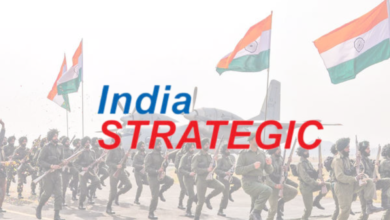President Emmanuel Macron of France graces Republic Day celebrations
Strengthens the strong bilateral relations between the two countries
By India Strategic Correspondent
New Delhi. India rolled out the red carpet for President Emanuel Macron of France, this year’s Chief Guest at the 75th Republic Day celebrations with Prime Minister Narendra Modi receiving him at Jaipur ahead of his arrival in Delhi for the event.
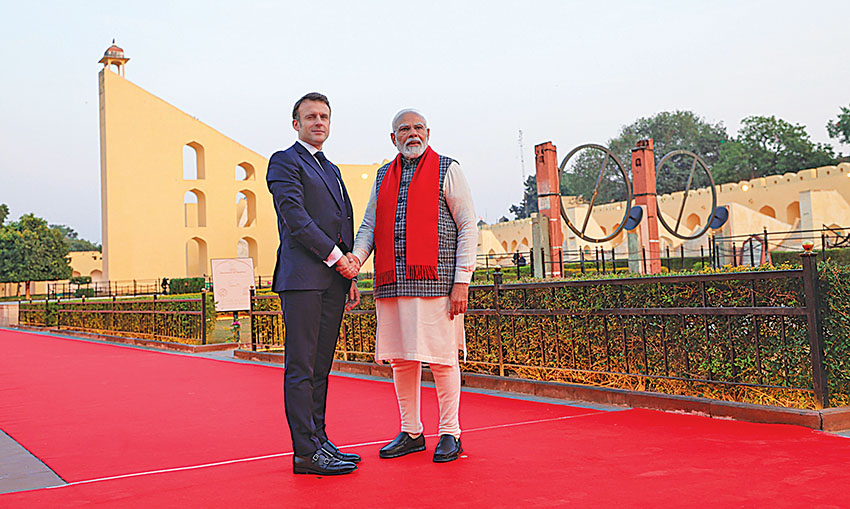
It was the sixth time that a French leader was the Chief Guest at the Parade, which this year witnessed the participation of French defence forces comprising a marching contingent, military band, fighter jets and a multirole aircraft tanker.
The unique feature of the event was that President Macron graced the occasion, six months after he had invited Prime Minister Narendra Modi to attend the French National Day on July 14 in Paris last year.
On a perfect January morning, under a warm winter sun that bathed the majestic Kartavya Path, the visiting dignitary and members of his delegation were treated to a rare combination of India’s military might and showcasing of its diverse and rich cultural heritage.
The delegation were in the august company of President Droupadi Murmu, the Supreme Commander of the Indian Armed Forces, Vice President Jagdeep Dhankar, Prime Minister Modi and members of his Council of Ministers.
On January 25, PM Modi hosted President Macron at Jaipur, meeting him at Jantar Mantar, the 18th century solar observatory which features on UNESCO world heritage list. The leaders travelled in open vehicle towards Hawa Mahal, the iconic tourist landmark in the city.
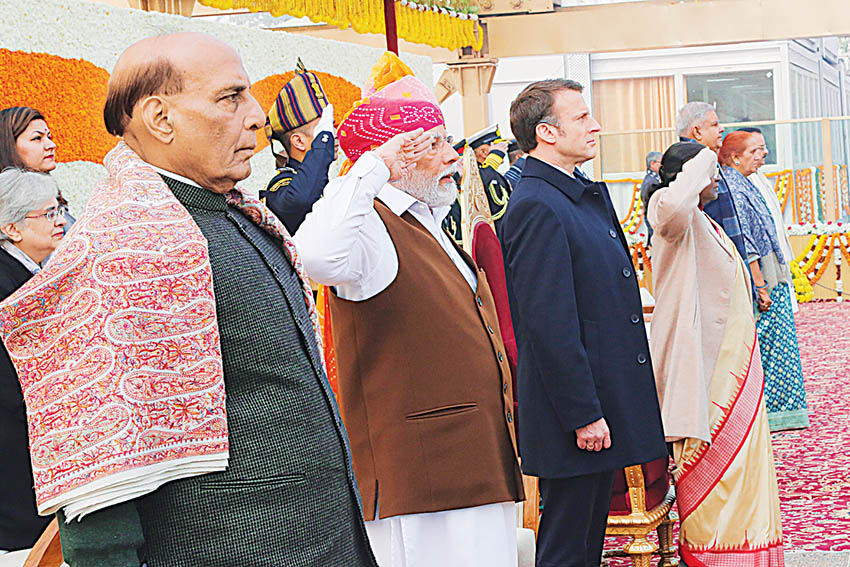
They also sat at a roadside tea shop in the old city to savour the beverage and the feel of the erstwhile capital of Rajput kings. The sojourn gave the visiting leader a glimpse of Rajasthani culture and tapestry, but there was also an official segment of bilateral talks that deepen the strategic partnership between India and France.
Defence Industrial Partnership and Comprehensive Agreements
The outcomes from the official talks included a Roadmap for bilateral industrial partnership in defence; a letter of intent for defence space partnership; a MoU between New Space India Limited and Ariane Space SAS; a MoU between TATA Advanced Systems Limited and Airbus for an assembly line for H125 helicopters in India; Framework cooperation arrangement between Department of Science and Technology (DST) and Institut National de Recherche pour L’Agriculture, L’Alimentation Et L’Environnement (INRAE); Framework arrangement on cooperation concerning funding of research projects between DST and Agence Nationale de la Recherche (ANR); Declaration of intent between the Ministry of Health and Family Welfare and Ministry of Labour, Health and Solidarity in the field; Letter of intent between Ministry of Personnel, Public Grievances and Pensions, and Ministry of Public Sector Transformation and the Civil Service, France on public administration and administrative reforms; Renewal of agreement between Ministry of Housing and Urban Affairs and Ministry of Ecological Transition and Territorial Cohesion of France on cooperation in the field of sustainable urban development.
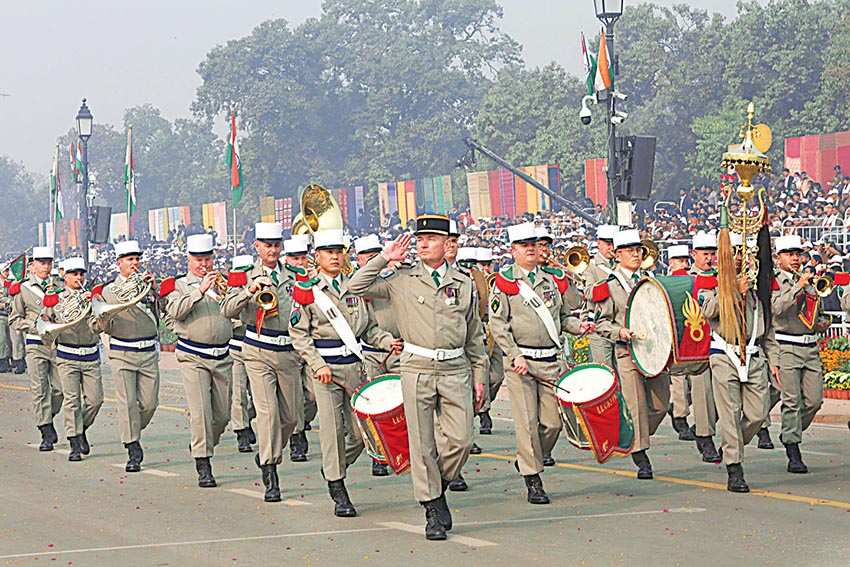
Key announcements
Providing further impetus to the wide-range of cooperation and engagement, the two sides announced that the year 2026 will be India-France Year of Innovation and in order to make the Indians travelling to the iconic Eiffel Tower a seamless experience, New Delhi and Paris said the UPI payment system will be operationalised.
India and France, who led the global International Solar Alliance decided to set up a Solar Academy n Senegal; establish diplomatic offices in Marseille and Hyderabad; start Young Professional Scheme under the Migration and Mobility Partnership Agreement; have validity of Schengen visa for Indian Masters alumni of French Institutions; and support France that is organising the UN Ocean Conference in Nice next year.
Besides holding significance for bilateral relations especially in the areas of defence and strategic cooperation, the visit focused on other sectors like space, administrative machineries interaction and promote people-to-people relations.
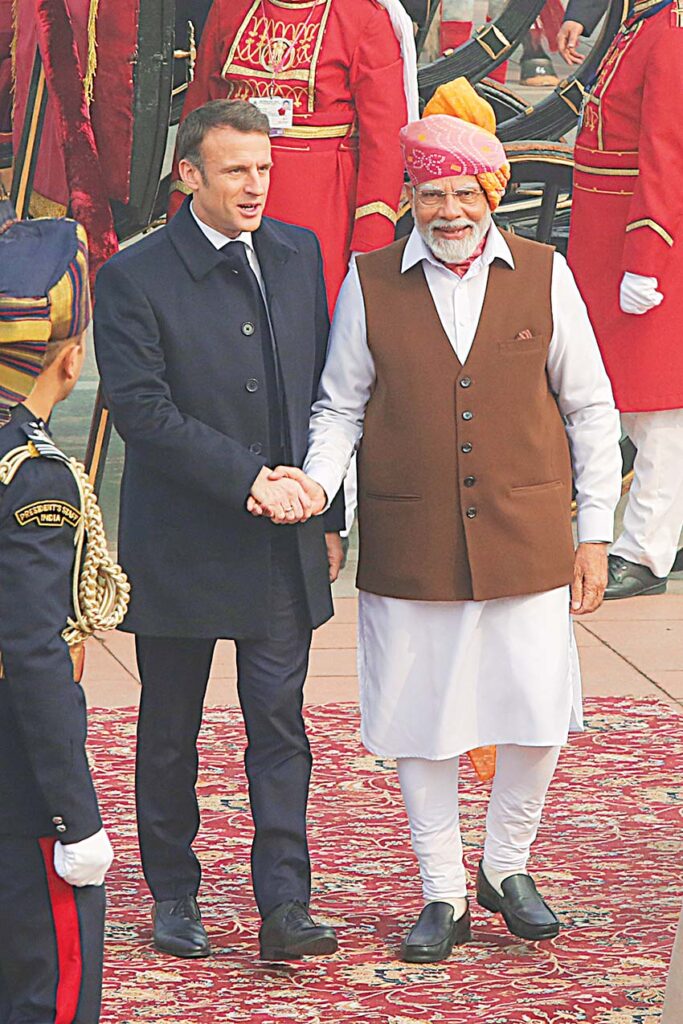
Indo-Pacific
With Indo-Pacific gaining strong connections across the two oceans, the construct has become prominent and over the years its significance has encompassed beyond the geographical contours. It is now being viewed as a strategic concept that reflects interconnectivity and inter-dependence of nations where the oceans lap its shores.
During July 2023, India and France came up with a roadmap ‘Horizon 2047’ where the two sides mention of working together in the interest of international peace and stability and reaffirm their commitment to a rule-based order in the Indo-Pacific and beyond.
In the joint statement at the end of the visit, both PM Modi and President Macron reiterated commitment to further deepen the long-standing partnership on the common vision for the Indo-Pacific region.
The leaders emphasized the region’s significance for their respective sovereign and strategic interests. They also acknowledged the crucial role of their partnership in the region for advancement of a free, open, inclusive, secure and peaceful Indo-Pacific and beyond. Referring to the Comprehensive Roadmap both leaders expressed satisfaction at the expanding nature of their engagement in the region.
China and Indo-Pacific
From a strategic perspective, the Indo-Pacific region is witnessing a shift in power dynamics, driven by the rise of China as a major economic and military power.
China’s agressive behaviour in the South China Sea, its Belt and Road Initiative , and its increasing naval presence have raised concerns both regionally and globally, leading to a re-assessment of security and economic strategies particularly in the region.
Strategically, the Indo-Pacific is crucial for trade, energy flows, and security. It hosts some of the world’s busiest shipping lanes, making it vital for global commerce. Furthermore, the region is rich in natural resources, including oil and gas reserves, making it an area of economic interest for major powers.
For India, the Indo-Pacific represents an extension of its maritime interests and security concerns. As a net security provider in the Indian Ocean region, India seeks to ensure maritime security, combat piracy, and counter illicit activities. Additionally, India’s Act East Policy aims to strengthen ties with Southeastern Asian nations and enhance connectivity in the region, aligning with the broader Indo-Pacific framework for peace and stability.




